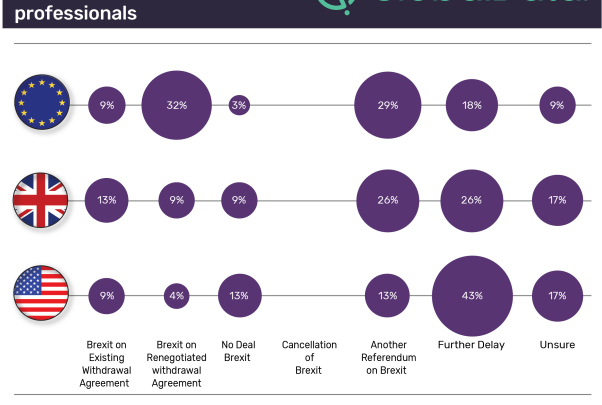
Three years on since the UK voted to leave the European Union (EU), and after the third extension of the Brexit deadline, the departure date is now set for January 31, 2020. After an unsuccessful attempt to get the country out of the EU within the October 31 deadline, UK Prime Minister Boris Johnson, decided to call a national ballot on December 12 to resolve the Brexit deadlock.
GlobalData’s latest Brexit tracker, ‘Brexit and the Healthcare Industry – Implications for Pharma, Q3 2019’, found that healthcare industry professionals are quite divided regarding Brexit’s outcome post January 31 with 26% and 43% of the UK and US respondents, respectively, stating that there will be a further delay once the current deadline is reached, and 43% of the EU respondents believing that Brexit could be achieved by renegotiating a current withdrawal agreement.
Image for publication: Please click here
Urte Jakimaviciute, Senior Director of Market Research at GlobalData, commented: “The UK’s initial withdrawal date was March 29, 2019, but after seven months of ongoing political division, economical paralysis and unsuccessful attempts to deliver Brexit, it seems that the pharma industry is still unsure whether the stagnation period is going to end. Nevertheless, compared to data we had before the previous October 31 Brexit deadline; this time, the respondents seemed to gain more confidence that a no-deal Brexit scenario can be avoided.”
With the general elections approaching, the UK’s main political parties present different agendas for Brexit. Conservatives are determined to have parliament’s vote on the EU withdrawal agreement before Christmas and leave the EU before January 31. On the other hand, Labour is pledging to renegotiate the agreement with the EU and hold a referendum on a new deal with an option to remain in the EU included. By revoking Article 50, the Liberal Democrats (Lib Dems) and the Scottish National Party (SNP) are planning to remain in the EU. In the event of failure to cancel Brexit, SNP promises to hold another EU referendum.
Jakimaviciute continues: “Further delay to Brexit may be associated with pharma predicting a hung parliament or even a change in the ruling party. While most of the latest public opinion polls predict the victory of the Conservatives, winning may not be enough. Under a Conservatives-led majority government, the UK might split from the EU by January 31, ending the Brexit saga. However, if Boris Johnson wins without a majority, with his deal being stuck in the Commons, he could be forced to hold another referendum.”
The UK’s general election is a tactical game. The Brexit Party has officially announced that it will withdraw its candidates from seats where the Conservatives could win in an effort to unite ‘leave’ voters. Likewise, pro-EU parties – the Lib Dems, the Green Party and Plaid Cymru – have announced a ‘remain’ election pact in 60 constituencies in the hope of taking more seats. Nevertheless, Lib Dems ruled out the possibilities of electoral packs with the largest opposition party – Labour – stating that it is not pro-remain.
Jakimaviciute adds: “While the pharma industry continuously indicates that the preferred outcome of Brexit is no Brexit, it is easier said than done. If pro-referendum parties won, due to time needed to get the referendum organized, Brexit would not be resolved before the deadline. While revoking Article 50 might seem as an easier solution, there are no certain directions coming from legislative bodies on whether a new Prime Minister would need an approval from parliament to revoke or if the UK would need to have a referendum to overrun a referendum.
“The only certain thing about Brexit is uncertainty. Conservatives securing a majority may throw the UK into post-Brexit economic slowdown and regulatory limbo. Then again, any other election outcome might bring the UK’s and Brexit’s fate back into the hands of the EU.” pr@globaldata.com







